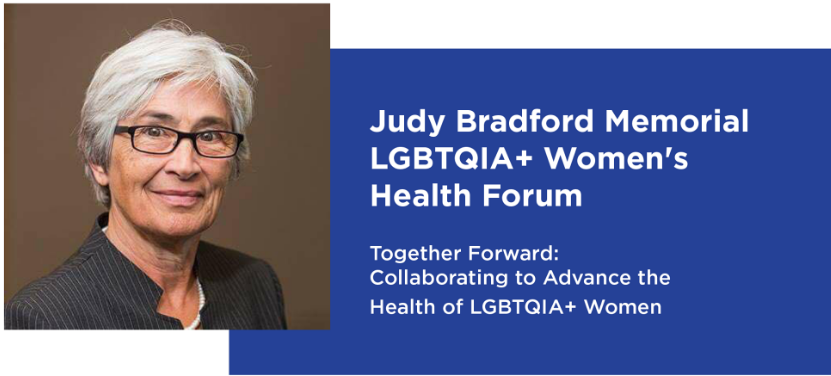The 2020 Judy Bradford LGBTQIA+ Women’s Health Research Forum was hosted virtually by The Fenway Institute on October 30th and 31st. The forum brought together community members, healthcare providers, and researchers to discuss strategies to improve engagement in primary and mental and behavioral healthcare among LGBTQIA+ women.
Comparatively, LGBTQIA+ women experience more physical, mental health, and substance use problems than their cisgender and heterosexual peers. A better understanding of barriers to care and innovative strategies to overcome these barriers is needed. The forum offered a chance to collaborate on experiences, science, and ideas related to increasing engagement in care and reducing health inequities. The experiences and ideas shared at this forum will be used to guide future steps in clinical care and research to enhance the health and wellbeing of LGBTQIA+ women.
Keynote speaker Dr. Deborah Bowen spoke on the need for more high-quality intervention research for sexual minority women and for greater collaboration between researchers and community members. “If we’re about changing policy, we need to produce the kind of evidence that is high-quality, that has a description of the intervention, that has an evaluation… and we have to produce those with enough numbers to be convincing that we have a disparity and we can take care of the problem,” she said. “[Academics and community members] can learn from each other and work together and design a better study together than apart. We need to build better bridges between academic and community focuses.”
Dr. Judy Bradford was a pioneer in the field of LGBTQIA+ research, leading some of the first national studies focusing on lesbian health. As founding Co-Chair of The Fenway Institute from its inception in 2001, Judy played a key role in building a framework for LGBTQIA+-focused research and teaching. She was the first research scientist to head an NIH-funded population studies center focused on sexual and gender minority health, and the first to receive NIH funding to support a summer institute to train the next generation of LGBTQIA+ health researchers, held right here at Fenway. Judy was a key influencer of NIH policy as a member of the Council of the National Institute of Minority Health and Health Disparities. She was a passionate believer in improving the health of our communities by performing ground-breaking research and mentoring the next generation of LGBTQIA+ health scientists.
Dr. Kenneth Mayer, Co‑Chair and Medical Research Director of The Fenway Institute, spoke about Dr. Bradford’s legacy and mentorship. “Judy had an infectious smile and could charm anybody to do anything,” he said. “She was passionate about paying it forward and helping to create the next generation of scholars.”
Panelist Tanekwah Hinds discussed the need to think beyond just diversity and empower marginalized groups. “Instead of asking whether people with marginalized identities have a seat at the table, we should be asking ‘how are we empowering [community members] so that they can create their own table?’” she said.
Panelist Allegra Gordon discussed the need for schools of public health and medicine to include teaching in advocacy, anti-racist curriculum, and weight stigma.
We’d like to thank everyone who joined us for these important community conversations.


